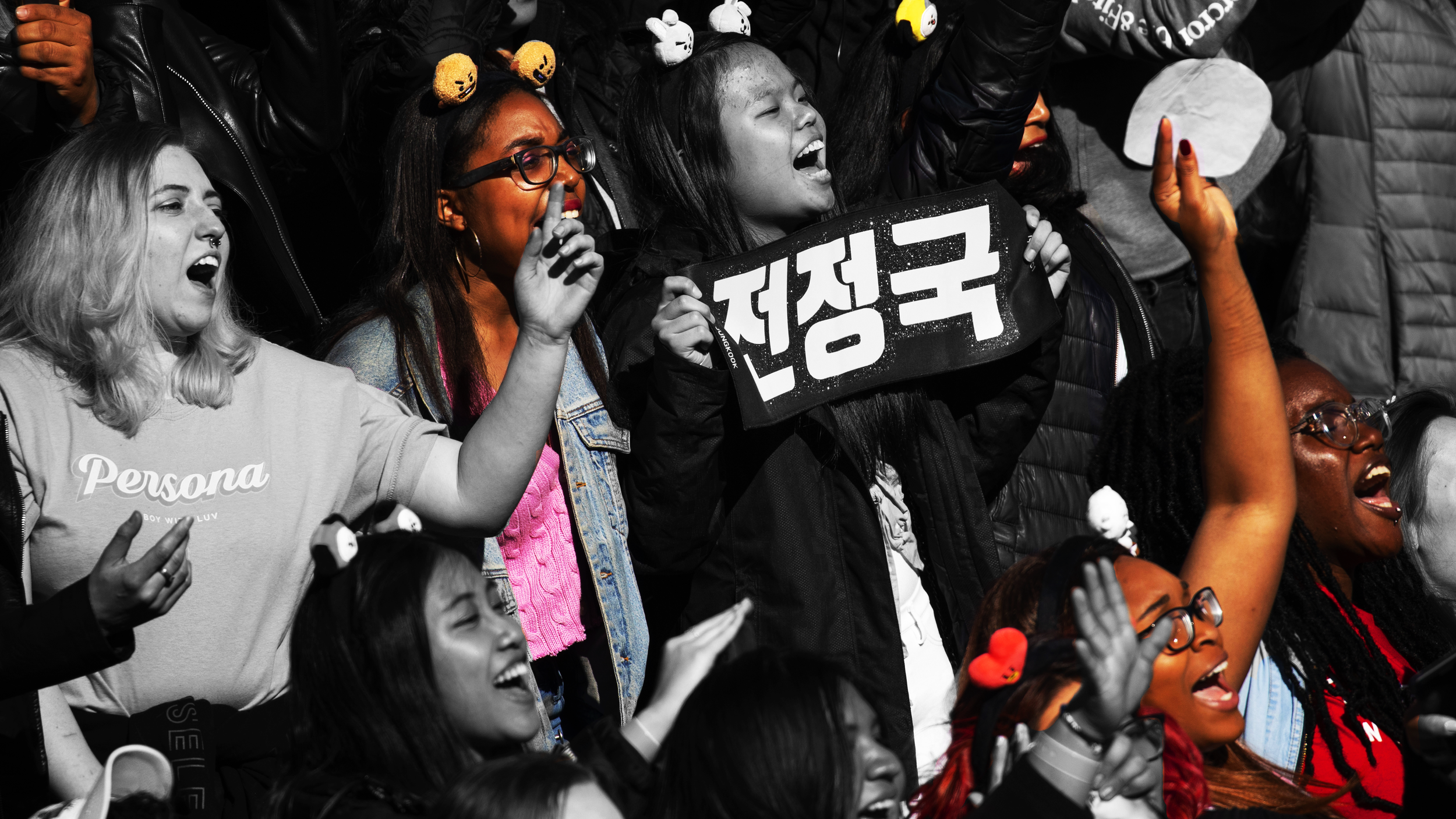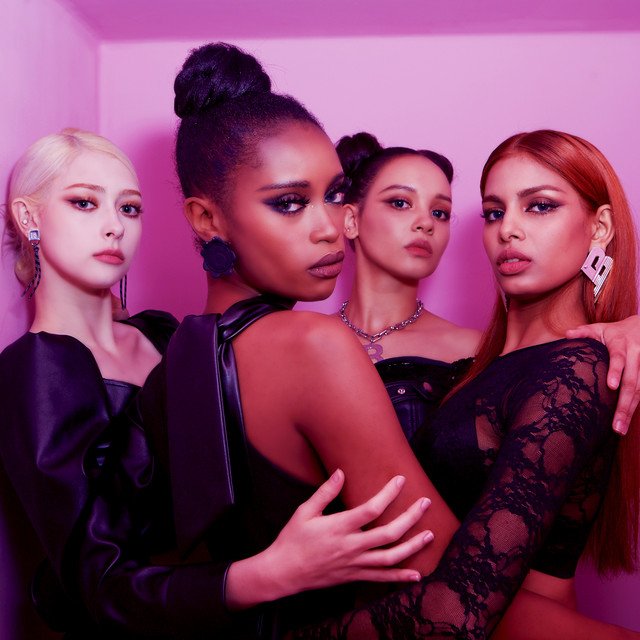A Black Fans’ Guide to K-Pop
A Black fans’ guide to K-Pop
Ever wondered what the appeal is for K-pop, or how someone gets into the hobby? India Chinyere explains that and more.
Article: India Chinyere
Image left: Drew Angerer (Getty Images)
What’s up with K-pop?
Colorful outfits, flashing lights, and catchy tunes. Korean pop music, also called K-pop, is all of that and so much more. The K-pop fandom is an amazing community where music is shared, connections are formed, and cultures are exchanged. K-pop has seen a rise in popularity in the West recently, with groups like BTS and Blackpink taking the world by storm. So, you might be asking, how do I get into K-pop as a Black fan? I’ll answer that! But first let’s talk about…TW: Mentions of violence, stalking, mental health, and racism
NOTE: This guide is only meant to scratch the surface of the K-pop world and is NOT a deep dive.
I am 27 years old, and I got pulled into the world of K-pop at 14. My journey began with another community that I am insanely passionate about, anime. Most people don’t know how deeply connected K-pop and anime are, especially considering how many iconic anime openings and endings have been sung by Korean artists. Examples are “Every Heart” by BoA (Inuyasha), “Houkiboshi” by Younha (Bleach), and “Take off” by 2PM (Blue Exorcist). I LOVE listening to anime soundtracks, so it wasn’t long before I found myself deep in the world of K-pop.
This was also around the time where I was thinking deeply about what career I wanted when I grew up. Back then, I was convinced I would be a diplomat for America in other countries. I had to interview someone who had insight on the career for a school assignment, and my mom introduced me to her professor, Dr. Yoon. During my (awkward, because I was an awkward teen) interview, he encouraged me to learn a foreign language as a part of my dream to become a diplomat. He recommended a class that met every weekend at a nearby church, and I attended all throughout high school and college. Attending those Saturday classes brought me a deeper understanding of Korean culture and is something that I feel shaped me into who I am today. But enough of that for now, let's talk about…
K-pop group Blackswan is the first group to consist of all on-Korean members. Fatou Samba (front) is Senegalese.
The Structure of K-pop
K-pop consists of many different genres. There’s pop music, hip-hop, R&B, trot, and more. When people hear the word “K-pop”, they mostly think of well-dressed boy and girl groups, but K-pop also has solo artists and co-ed groups.
Debuting in a K-pop group is not an easy process.
Before becoming a certified K-pop artist, individuals train for YEARS. These individuals are called “trainees”. Trainees usually live in company dorms during their training years. Trainees spend most of their time learning various “skills”, such as singing, dancing, acting, and variety show skills. Being a trainee does not guarantee debuting as a K-pop idol.
Training is extremely difficult. Some people drop out, while others are cut from the groups. Trainees who successfully complete the training process go on to debut in an official K-pop group or as a soloist. Due to the saturated nature of the K-pop market, not all K-pop groups and soloists are successful in their debut. Many disband without ever reaching fame. Another important point to understand as well is that not all K-pop artists are Korean. Many K-pop groups have non-Korean members. Examples are Twice, Black Swan, 2PM, F(x), and Blackpink.
Something that really makes K-pop stand out from other music industries is the heavy emphasis put on fan culture. Many K-pop groups and artists cater to their fans as a part of the K-pop experience. Fan meets, live internet broadcasts, and even personalized shows for the artists are a norm in K-pop. Many K-pop artists will release multiple versions of their albums with special “photocards” of group members within them. K-pop artists put on entire showcases for debuts and new albums and each K-pop group and artist have a fandom name. K-pop groups usually have fandom groups dedicated to the fandom. These take the form of official websites with exclusive updates on the artists. These websites sometimes have “fandom masters” who take the best photos, buy the best gifts for the artists, or even have a high level of participation overall in the fandom.
K-pop fans will wait at the airports for a chance to see their favorite artist get on a flight. This has led to the infamous “airport fashion”, in which K-pop artists will put on their best fits so their fans and the media can take photos of them. K-pop artists are made to seem like their fan’s “friends” and sometimes even their “boyfriends” and “girlfriends”. This is one of the many things about K-pop that is seen as a perk for fans to join in on the fun. I know that it all sounds like fun so far, but don’t get me wrong…
Fan interaction is a critical aspect of K-pop that makes it culture unique. Millions of people attend K-pop fan conventions and events year-round.
K-POP HAS PROBLEMS.
One such issue is the problem of “sasaeng” fans. Sasaeng fans are fans who are extremely obsessed with a specific K-pop artist. It is important to mention that sasaeng fans come from a variety of backgrounds and are not limited to one group of people. These sasaeng fans have been known to commit actual crimes, such as breaking and entering into artists’ homes, stalking artists, and leaking private information, with the most extreme of them having caused physical harm to artists. In the past, not much action was taken to discourage the actions of sasaeng fans. That is changing now, as many artists and companies are suing individuals who invade the privacy and rights of K-pop idols. While this is a start, it has not stopped many of the horrible crimes committed.
Another issue is the mental health of the K-pop artists themselves. Being a trainee is extremely difficult, and becoming an actual K-pop artist is even more difficult. One reason being that K-pop artists are often promoted as the “boyfriends” and “girlfriends” of their fans. This means idols sometimes have to hide their romantic relationships and sometimes “relationship bans” are written into contracts for the artists when they first debut. Breaking this ban can mean being kicked out of the group or dropped from the label (in other words, the end of your career). There is also extreme pressure put on K-pop artists to appear “perfect”. Any perceived misstep can cause a ton of hate to go their way. Internet bullying of K-pop artists is a major problem, with individuals sometimes spreading false rumors, or downright attacking K-pop artists. The internet bullying of K-pop artists has become so severe that malicious commenters are now liable to be sued if they say anything particularly heinous.
Extreme performance schedules, unrealistic responsibilities, and horrid contracts have also led to the decline in many idols’ mental and physical health. There have been many K-pop groups and soloists who have sued their companies for things such as physical and emotional abuse, being underpaid (and sometimes not paid at all), and ridiculously long contract times. Examples of groups who have sued or are suing their company are FIFTY FIFTY, Loona, and Lee Seung Gi. While many of the above issues are taking a turn for the better, there is still a long way to go in the K-pop industry until these problems are resolved.
Something important to note about the K-pop industry is how heavily influenced it is by Black culture in fashion, sound, dance routines, and even structure. K-pop groups are modeled after Black boy and girl groups from the 80s and 90, and often blend sounds of R&B, soul, Hip-Hop, and rap. In fact, most K-pop groups have at least one rapper in the group. K-pop artists have styled their hair in popular Black hairstyles, such as box braids, locs, and cornrows. This often comes with a lot of backlash due to K-pop artists appropriating these styles and having racist ideals at the same time. Although not as frequent, it was not uncommon to see a K-pop artist in the early 2000s rocking cornrows and wearing blackface at the same time. K-pop artists have been known to imitate Black women and make jokes at the expense of Black individuals.
These behaviors have been called out by Black and non-Black K-pop fans alike. However, the concerns of fans are sometimes dismissed, and the behavior is not always changed. This can be seen as a turn off for potential Black K-pop fans, however, there are positives to being a Black fan in the K-pop fandom. So now once again, I am sure you’re asking..Although k-Pop has issues with racism, shifting demographics in South Korea has led society as a whole to be more open-minded regarding racial issues. The above image is from a Seoul protest in 2020. (Source: Hankyoreh)
I love K-Pop because I love being a part of the Black K-pop fan community. Black K-pop fans have formed cover groups and made a community in the K-pop fandom where we can enjoy and express our love for K-pop with each other. Being in the K-pop fandom also brings along the joyful experience of learning about other cultures. The K-pop fandom is global, and it is amazing how much one can learn outside of their own culture and share their own culture with others. Specifically, being a Black K-pop fan can show Black individuals that our various cultures do have great influence on others and that we don’t have to be boxed into a stereotype. Oftentimes in the western world, Black people are told that our culture is subpar, wrong, and not loved or imitated. However, K-pop proves just how much influence Black culture has on the music world, language, and fashion. Meeting other Black K-pop fans has shown me that I don’t have to fit into America's stereotypical image of a Black woman. I can be whoever I want to be, and I am surrounded by other amazing Black individuals who are unique in their own ways.
Being a Black K-pop fan also paved the way for me to expand my horizons outside of the backyard of my small town. Attending the Korean language classes on Saturdays awakened my passion for advocating for the rights of POC in the United States. The Korean classes influenced my decision to study International Studies in undergrad and ultimately become a social worker. I formed amazing relationships in the Korean classes that have lasted me a lifetime. I am forever thankful for my parents taking me to Korean classes bright and early every Saturday morning. And I am forever thankful to my teachers and fellow students in Korean classes for encouraging me to be myself.
"K-pop proves just how much influence Black culture has on the music world, language, and fashion."
-India Chinyere
To sum it all up,
K-pop is more than just catchy songs. K-pop is a community of cultural exchange and learning. And while the K-pop industry and fandom have their problems, the benefits of engaging in the K-pop community are great and I encourage everyone to give K-pop a listen and a look too! Below is a playlist of K-pop songs (and live performances) for everyone to enjoy!



